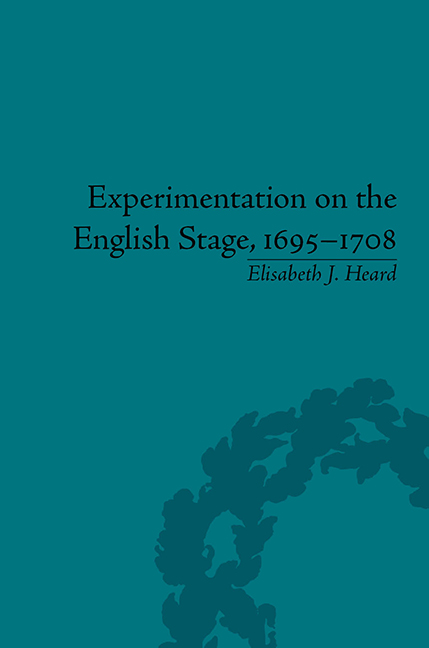Book contents
- Frontmatter
- CONTENTS
- Acknowledgements
- Introduction
- 1 The London Theatre World in the 1690s
- 2 Origins of ‘Humane Comedy’: Farquhar, Congreve, Cibber and Vanbrugh
- 3 Experimentation at the Turn of the Century
- 4 Successful Experimentation: The Recruiting Officer and The Beaux Stratagem
- 5 Farquhar's Contributions and the Post-1707 Theatre
- Conclusion: Farquhar and Anglo-Irish Drama
- Notes
- Works Cited
- Index
3 - Experimentation at the Turn of the Century
- Frontmatter
- CONTENTS
- Acknowledgements
- Introduction
- 1 The London Theatre World in the 1690s
- 2 Origins of ‘Humane Comedy’: Farquhar, Congreve, Cibber and Vanbrugh
- 3 Experimentation at the Turn of the Century
- 4 Successful Experimentation: The Recruiting Officer and The Beaux Stratagem
- 5 Farquhar's Contributions and the Post-1707 Theatre
- Conclusion: Farquhar and Anglo-Irish Drama
- Notes
- Works Cited
- Index
Summary
The years 1700 to 1705 saw an explosion of humane comedy. Freed from the old rules by Farquhar, playwrights like Steele and Centlivre also experimented with new characters, situations and endings. During the seasons 1701–2 to 1704–5 Cibber had two new plays produced, Steele had three, and Centlivre had four, indicating that management and audiences were at least receptive to experimentation. Farquhar tried his hand at an adaptation with The Inconstant (February 1702) and continued to develop his own brand of humane comedy with The Twin-Rivals (December 1702).
The 1701–2 Season: Steele's The Funeral, Centlivre's The Beau's Duel, Farquhar's The Inconstant
Early in this season, Richard Steele had his first play produced. The Funeral opened in December, shortly after Rich unexpectedly paid his actors extras for their services (often the actors had to pressure Rich in order to be paid at all). The comedy had ‘more than expected Success’. Since records for this season are scarce, we do not know how many nights the play was performed during the initial run; however, we do know that The Funeral entered into the repertory. From 1703 – the year The Daily Courant began running increasingly regular advertisements of play productions at Drury Lane (regular advertisements for Lincoln's Inn Fields did not appear until 1705) – until 1776, there is a record of 171 performances of The Funeral, 52 of which were benefits. In The Funeral, Steele begins his own form of experimentation, and while not all critics view his attempt as successful, many recognize that what Steele is doing is new and innovative.
A Comparison gives a detailed critique of the play and states that Steele ‘seems a good judge of Comedy; that he has touch'd some things very justly, that his Vices are new, and his Characters not ill drawn’. However, the critics in Comparison are not entirely satisfied with the play and note many of the problems.
- Type
- Chapter
- Information
- Experimentation on the English Stage, 1695–1708The Career of George Farquhar, pp. 43 - 84Publisher: Pickering & ChattoFirst published in: 2014



